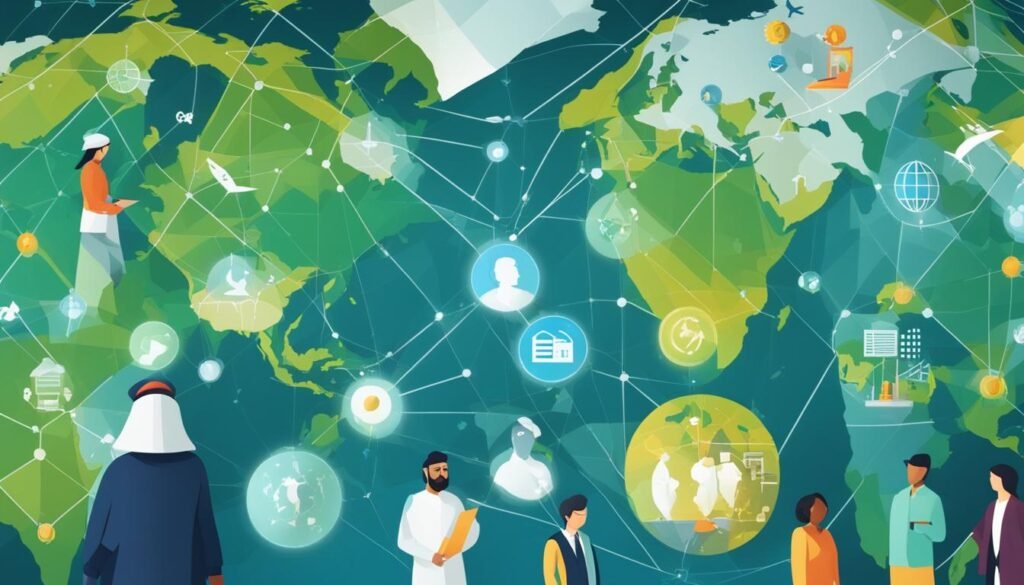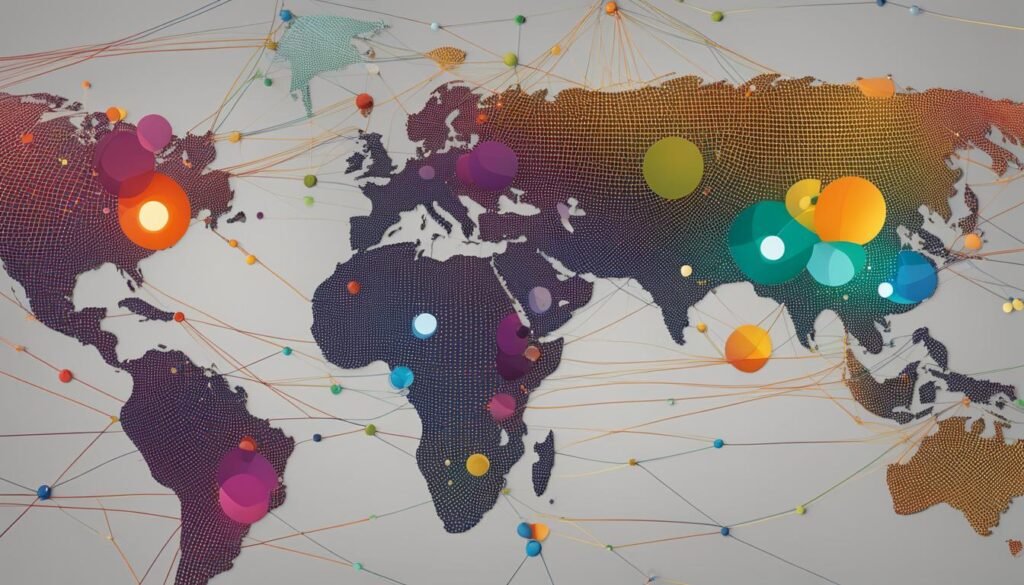Welcome to the world of global networking for OTHM learners! As an OTHM learner at The Continents States University, you have the unique opportunity to connect with a diverse community of learners from around the globe, expanding your horizons and strengthening your professional connections.
The Continents States University is a renowned online university accredited both in the UK and internationally. It offers an exclusive annual membership-based online learning platform for OTHM learners, recognized by OTHM. With just a one-time annual membership fee, you gain access to a world of possibilities.
By joining the Continents States University’s online learning platform, you become part of a global network that transcends geographical boundaries. Interact with learners from various nationalities and organizations, forging connections that will enrich your learning journey and boost your career prospects.
Unlock the power of global networking as an OTHM learner and discover a world of opportunities. Connect with professionals from different countries and cultures, exchange knowledge, and collaborate on projects that make a real impact across borders.
Key Takeaways:
- Global networking provides OTHM learners with opportunities to connect and collaborate with individuals from around the world.
- Networking with professionals from different organizations can enhance career prospects and lead to international collaborations.
- Active participation in online forums, social media platforms, and professional organizations is crucial for building a global network.
- Technology plays a vital role in facilitating global networking, with online tools enabling seamless communication regardless of geographical boundaries.
- Success stories of global networking for OTHM learners highlight the impact on personal growth, career advancement, and research collaborations.
The Benefits of Global Networking

Global networking for OTHM learners offers numerous benefits. Firstly, it allows you to connect with individuals from different countries and cultures, providing a diverse and global perspective on various topics. By engaging with people from diverse backgrounds, you gain valuable insights and broaden your horizons.
Additionally, networking with professionals from different organizations opens doors for career opportunities and paves the way for international collaborations and partnerships. Building connections with like-minded individuals in your field can lead to mentorship, job referrals, and access to new markets and opportunities.
Moreover, global networking can foster personal growth, knowledge sharing, and the exchange of ideas. By interacting with professionals worldwide, you have the opportunity to learn from their experiences, share your own insights, and collaborate on innovative projects. This exchange of knowledge enhances your learning experiences as an OTHM learner and enables you to stay updated with the latest industry trends and practices.
Global networking is essential for OTHM learners looking to thrive in a competitive and interconnected world. It allows you to tap into a vast pool of resources, expand your professional network, and stay ahead of the curve. By actively participating in networking events, utilizing online platforms, and engaging with professionals worldwide, you can unlock unlimited opportunities for growth and success.
Building a Global Network

Building a global network is essential for OTHM learners who want to expand their connections and opportunities. By strategically engaging with others, you can create a strong network that opens doors to new collaborations, insights, and career prospects.
First and foremost, actively participate in online forums, discussion boards, and virtual events specific to your field of interest. These platforms offer valuable opportunities to connect with like-minded individuals and industry professionals from around the world. By contributing to discussions and sharing your expertise, you can establish yourself as an active and engaged member of the community.
Utilizing social media platforms, such as LinkedIn, is another effective way to build your network. Create a compelling profile that highlights your skills, experiences, and aspirations. Seek and connect with individuals who share similar interests or work in your desired industry. Engage with their content, share insightful articles, and initiate meaningful conversations to cultivate authentic connections.
Additionally, consider joining relevant professional organizations and societies. These associations often offer networking events, conferences, and seminars where you can meet industry leaders and potential mentors. Keep an eye out for opportunities to engage with others in your field, both online and offline.
Lastly, never underestimate the power of reaching out to alumni and mentors. These individuals have valuable insights and connections that can support your network-building efforts. Seek their guidance, ask for introductions to their contacts, and take advantage of the experiences they can share.
Remember, building a global network takes time and effort. Be proactive, genuine, and consistent in your interactions, and you’ll find that your connections will grow organically, leading to exciting opportunities and a thriving professional network.
Leveraging Technology for Global Networking

When it comes to global networking, technology is the key that unlocks limitless opportunities for OTHM learners. The digital era has provided us with powerful online networking tools that transcend geographical boundaries, allowing you to connect and collaborate with professionals from around the world. By leveraging technology, you can expand your network, engage with like-minded individuals, and broaden your horizons.
One of the most effective ways to leverage technology for global networking is through the use of online communities and collaboration platforms. These platforms provide a virtual space where OTHM learners can come together, share ideas, and work on projects regardless of their physical location. By participating in these communities, you can tap into a wealth of knowledge and expertise, and build meaningful connections that can propel your career forward.
Virtual Networking Events, Webinars, and Group Discussions
Another valuable resource for global networking is virtual networking events, webinars, and group discussions. These online gatherings bring professionals from diverse backgrounds together, creating opportunities for learning, sharing insights, and making valuable connections. Through video conferencing technology, you can engage in real-time discussions, ask questions, and showcase your expertise in your field of interest. Participating in these events allows you to build relationships with individuals who share your passion and can contribute to your professional growth.
Moreover, social media platforms and professional networking websites are powerful tools that can expand your network and open doors to new opportunities. Platforms like LinkedIn enable you to create a professional profile, connect with industry leaders, and join groups specifically tailored to your interests. By actively engaging with these platforms, you can stay up-to-date with the latest industry trends, exchange insights with professionals worldwide, and establish your online presence as an OTHM learner.
Remember, technology is not just a means to an end but a gateway to a world of possibilities. Embrace the digital revolution, explore online networking tools, and leverage technology to connect with individuals across the globe. Harness the power of virtual collaboration, engage in virtual events, and utilize social media platforms to expand your network and engage with professionals who can help shape your future success.
Together, as OTHM learners, we have the opportunity to leverage technology and create a global network that knows no borders. Start building your connections today and let technology be your ally in your quest for professional growth and success.
Success Stories of Global Networking for OTHM Learners

Global networking has proven to be a game-changer for OTHM learners, with numerous success stories showcasing the transformative impact of connecting with professionals worldwide. These success stories demonstrate how global networking opens doors, creates opportunities, and propels learners towards their goals.
International Job Opportunities
Through their global connections and collaborations, OTHM learners have successfully secured international job opportunities. By tapping into a diverse network of professionals from different countries, learners have expanded their horizons and accessed career prospects beyond their local market. These success stories highlight the power of global networking in bridging gaps and facilitating cross-border employment.
Mentorship and Guidance
The global networking platform offered by The Continents States University has enabled OTHM learners to find mentors and advisors who have played a pivotal role in their professional development. These mentors, with their wealth of experience and industry insights, have provided guidance, support, and valuable connections, helping learners navigate their careers and achieve their objectives.
Research Partnerships and Joint Projects
Global networking has facilitated the formation of research partnerships and joint projects among OTHM learners. By connecting with like-minded professionals across borders, learners have been able to collaborate on innovative research initiatives, contributing to advancements in various fields. These success stories underscore the immense potential of global networking in fostering knowledge exchange and collective growth.
These success stories demonstrate that global networking is not just a buzzword; it is a powerful tool that empowers OTHM learners to reach new heights in their personal and professional journeys. Through connections made on the global stage, learners can unlock doors to international career opportunities, gain valuable mentorship, and collaborate on impactful projects. The Continents States University’s commitment to providing a robust online learning platform facilitates the realization of these success stories and sets OTHM learners on a path towards global success.
Conclusion
Global networking is a valuable asset for OTHM learners, offering a myriad of benefits for personal and professional growth. By actively participating in online communities, leveraging technology, and fostering connections with professionals worldwide, you can expand your network and create meaningful relationships across borders.
Through global networking, you gain exposure to diverse perspectives, cultures, and ideas, enhancing your understanding and broadening your horizons as an OTHM learner. Networking with professionals from different organizations opens up a world of career opportunities and potential collaborations, allowing you to tap into a global talent pool.
With the support of a reputable online university like The Continents States University, you have the resources and platform to enhance your global connections. By taking advantage of online platforms, virtual events, and social media, you can actively engage with like-minded professionals from around the world, fostering knowledge exchange and mutual growth.
In today’s rapidly evolving professional landscape, global networking is more essential than ever. The connections you forge across borders can propel you towards success by empowering you with new insights, opportunities, and collaborations. Embrace the power of global networking as an OTHM learner and unlock a world of possibilities.
Source Links
- https://msbm.org.uk/bath-and-north-east-somerset/subject/hotel-travel-and-hospitality-management/tourism-regulations-and-compliance
- https://msbm.org.uk/bath-and-north-east-somerset/subject/health-and-safety/health-and-safety-regulations-and-compliance
- https://msbm.org.uk/bath-and-north-east-somerset/subject/hotel-travel-and-hospitality-management/services-in-hospitality-and-tourism


